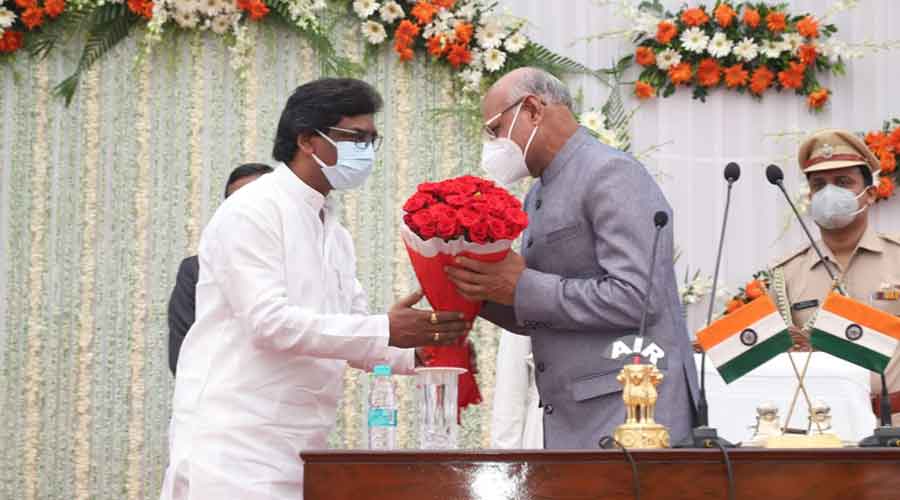Jharkhand governor Ramesh Bais is understood to have returned the anti-mob lynching Bill passed by the state Assembly in the last winter session, asking the state government to revisit the definition of a "mob" and correct a mismatch in the description of a witness protection scheme in the Hindi and English versions of the proposed law.
While governor’s principal secretary Nitin Madan Kulkarni did not confirm the developments saying he was on leave, highly placed sources in Raj Bhavan said on Thursday that the Bill, titled Jharkhand (Prevention of Violence and Mob Lynching) Bill of 2021, was returned on Wednesday night. Sources in the governor's house also circulated a PDF file of a purported statement to the media on Thursday afternoon explaining the objections raised.
The Raj Bhavan statement, which was unsigned, read, “There were two objections to the Bill... First, there is a mismatch between the Hindi and English versions of the Bill. Section 2: Sub section-I, Sub Clause-xii deals with ‘Witness Protection Scheme’ (in English version of the Bill). This clause-xii is missing in the Hindi version of the Bill. This needs to be rectified/ corrected by the State Government so that there is a symmetry in both the versions of the Bill.”
The state further added, “Secondly, there is a need to re-consider the definition of ‘mob’ as given in Section 2(vi) of the Bill, which is not in consonance or in line with the well-defined legal lexicon/glossary. A group of two or more individuals cannot be called ‘A tumultuous crowd’. A mob is large, angry and disorderly crowd of people who are often uncontrollable or violent. The State Government must re-visit the definition of the ’Mob’.”
The Bill was passed by Jharkhand Assembly on December 21, 2021 after which it was then sent to Raj Bhavan for the governor’s assent. Only Bengal and Rajasthan have enacted similar laws against mob lynchings.
As per provisions of the Bill, in case of a lynching death, the guilty could be jailed for life and would have to pay a penalty of anywhere between Rs 5 lakh-Rs 25 lakh. In case of minor injuries to victims, the guilty faces a three-year jail term and fine of Rs 3 lakh. For grievous injuries, the guilty face life imprisonment or jail term of up to 10 years with a fine of up to Rs 5 lakh. Those found guilty of conspiring, aiding and attempting to lynch are to be treated at par with those who commit lynching.
Those guilty of false propaganda through hate speech and the like to create a toxic environment against a particular person/community, face a three-year jail term with a fine of up to Rs 3 lakh.state parliamentary affairs minister Alamgir Alam, while tabling the bill last year in the Assembly, said that there was a need to have a stringent law in place to curb incidents of mob crimes in the state.
During the ongoing budget session, on March 14, the state government, in response to an MLA's question, said that 46 cases of mob lynchings were recorded in the state between 2016 and 2021. In 11 cases, 51 accused were convicted to life imprisonment after completion of trial. Alamgir in his reply added that in rest of the cases, legal proceedings were on. The state government has so far provided Rs 19.90 lakh compensation to the dependents of mob lynching victims.
Other provisions of the Bill include the appointment of a state co-ordinator not below the rank of Inspector General of Police as a Nodal Officer to monitor and co-ordinate efforts to prevent lynchings. The nodal officer will be appointed by the Director General of Police.
The Nodal Officer, on enactment of legislation will be required to hold regular meetings, at least once a month, with local intelligence units in the districts to identify tendencies of vigilantism, mob violence or lynchings in an area and take steps to prevent dissemination of offensive material through different social media platforms or any other means which could incite mob vigilantes.
The Bill also states that every police officer, directly in charge of maintaining law and order in an area, shall take all reasonable steps to prevent any act of lynching including incitement and commission and will make all possible efforts to identify and prevent instances of dissemination of offensive material or any other means to incite or promote lynching. District magistrates too are mandated to take every possible action to curb creation of any hostile environment against a person or group of persons.
Jharkhand home secretary Rajiv Arun Ekka was unavailable for further comment.











